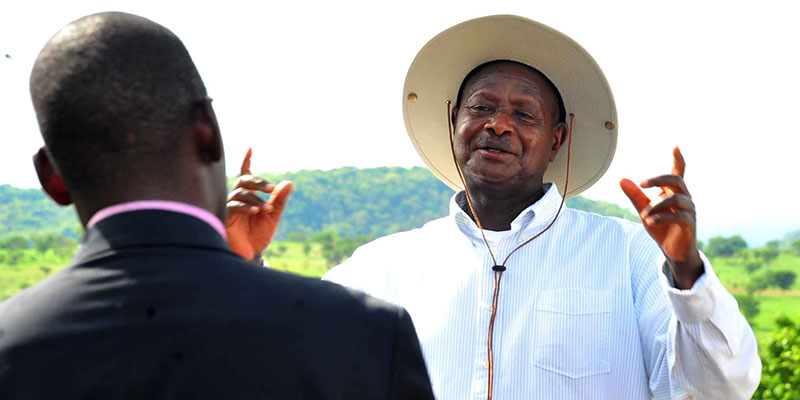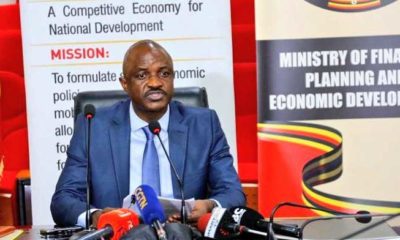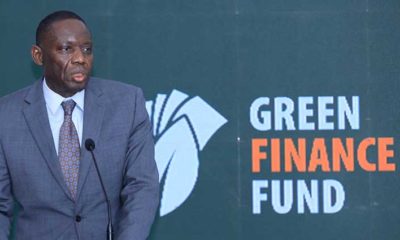Columnists
Our leaders; think like economists

President Yoweri Museveni (R)
Many of the policies that we have chosen to transform our economy were not informed by economics. They were informed by politics, and ego which sometimes we mistake as ideology or vision!
Countries develop only when their leaders and other policy and decision makers stop thinking like laymen. Given what is going on in our country, I am inclined to believe that our leaders and policy makers (just like many other African countries) rarely think like economists.
The natural questions that should come to anyone’s mind now are: (1) How do economists think? (2) Why is it important to think like them? (3) What do Ugandan leaders and policymakers do that make me conclude they rarely think like economists? (3) How do they think anyway?
The last thing I would want to do is to turn this into a lecture. The second is to bog anyone down with a lot of “useless” economic theory. So I will try to answer the above questions very simply and perchance more grippingly, using real life analogies.
So how do economists think? Economists think that people only respond to incentives, not to announcements, mobilization or threats. They also think that everything on this planet has a price or cost; that there is no such thing as a “free lunch.” And that there are at least two sides to every interaction or action. They think that everything that we do affects everything else (opportunity cost). Economists also believe that any action can bring with it significant unintended consequences. And lastly that in this world of complex interrelationships, no one can really be in control all the time or even most of the time.
One may ask, what’s new? What don’t we know in the list above? Indeed there is nothing new; the list has obvious “things” that every human being seem to know. Except that unlike other people, economists look at those things using three core tools — economic rationality, marginal analysis, and optimization.
Brilliant goals; irrational means
I know every profession is taught in its own language and makes its graduates think in a certain way. Mathematicians talk about axioms, integrals, and vector spaces. Psychologists talk about ego, id, and cognitive dissonance. Lawyers talk about venue, torts, and promissory estoppels. Soldiers talk about tactics, operation zone, shooting range, mission, and standard operating procedure. If you carried out a scientific survey in Uganda, you will realise that our leaders, policymakers, and managers approach decision making in line with their training.
Many of the decisions or policies that we have chosen to transform our economy and society were not informed by economics. Many were informed by politics, others by commonsense, and a few by ego which sometimes we mistake as ideology or vision. Yet we have many economists in the country!
I will use one example to elaborate my point today. NRM government has set itself a goal: To transform every Ugandan peasant household into a commercial farming household, earning at least Shs.25 million a year. Brilliant goal. Problem? The means of achieving the goal are irrational.
Mr. President, I have heard you on several occasions calling upon your colleagues in the party and government to “mobilize our people to engage in commercial farming”. You seriously believe you can mobilize people using political rallies, radios, seminars, and model farmers to abandon subsistence farming and become commercial farmers!
Consequently, I have seen and heard several leaders — minister, RDCs, local government leaders, “model farmers”, journalists etc — “teaching” people how to modernize their farms. Do you leaders of NRM seriously think that you can convince Ugandans, via radios, newspapers, public rallies, and seminars to boost agricultural production?
Tragedy of peasantry
Have you ever thought of using incentives to have the Ugandans “work their gardens a little bit harder”? Have you thought of stabilizing demand for agricultural produce first, such that you stabilize farm-gate prices that a farmer is receiving for his/her produce? Have you looked into ways of reducing post-harvest losses as an incentive to boost farming?
Do you really know what is going on in the lives of the peasants you are mobilizing? This is what is happening. A young man listens to radio one evening, where his local leader, the NAADs official and a journalist are discussing the vision of having every family commercial farming. The journalist casually picks maize as a crop to talk about. The local leader talks how maize is very easy to plant and harvest, and how the price in Kampala and within the region is good.
“A kilo of maize grain now goes for Shs.700,” the local leader tells the listeners. The NAADs officials chips in to provide the “technical advice” – the science of growing maize. How to space it, how to weed, harvest and manage moisture content etc. He also estimates the unit cost of growing an acre of maize. “It’s only Shs.350,000; and you harvest a tonne per acre. This translates into a unit cost of Shs.350 to produce a kilo of maize,” the NAADs man concludes.
The following morning, the young man picks his Shs.50,000 note he owns in life at the moment, goes to the near-by local shop and buy four brand new hoes. He and his family spend months in the garden growing maize on their two acre family land. They follow, to the dot, the advice they were given on radio. They borrow some Shs.700,000 from the village SACCO to invest in the activity. In the meantime, several other villagers who listened into the program are doing the same.
So by the time they harvest, everybody else is harvesting. It’s a bumper season for maize. The middlemen from Kampala who buy the maize from the villagers descend to the village but offer Shs. 300 per kilo now that supply is high. Remember the local leader told the people maize is at Shs.700 per kilo. So the young man went into the garden with the expectation that he will earn Shs. 700,000 per ton. Now he is being offered Shs.300,000. He cannot even repay the SACCO debt. He decides to speculate by keeping his maize for a couple of weeks to see whether the price will increase a bit. Indeed the price picks up a bit after a month to Shs.500 a kilo.
Post-budget analysis
Problem is, when the young man decides to sell, he realises most of his maize was attacked by insects, rodents, and moisture because of poor storage facilities. So he ends up getting zero price. Frustrated, the young man sells one of the acres land, buys a bus ticket to Kampala where he purchases a boda-boda to try his luck away from the risky agriculture. His neighbour sells her land too, and goes to the nearby trading centre to open up a salon.
The cumulative effect translates into Uganda Bureau of Statistics (UBOS) telling Ministry of Finance how the services sector (boda-boda, bars, salons, vending Chinese products etc) is growing very fast while agriculture is dwindling. Finance prepares the budget where they indicate agriculture will be a priority by giving farmers free planting and breeding materials worth Shs.200 billion to boost the sector.
The MPs, mostly in yellow, give the minister a standing ovation for presenting a pro-poor budget. Radio and TV talk-shows embark on the post-budget analysis and afford the leaders more opportunity to mobilize people to engage in commercial agriculture, now that more money has been allocated to the sector.
This is good politics, excellent commonsense but no economics at all. Results? NRM wins the 2016 general election by land slide; more research papers are written, more State of the Economy reports, indicating how GDP is growing impressively supported by the services sector, are published on Bank of Uganda website. In the meantime, more young people get more frustrated.
Seriously, this country can do better. Our leaders should start thinking like economists. If they can’t, let them hire us to do the thinking and they concentrate on what they do best — leading!
Comments






















